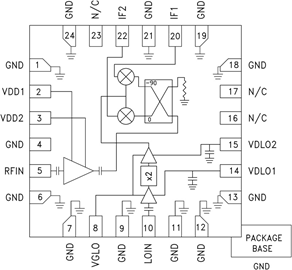

- Manufacturer Part Number : HMC1065LP4ETR
- Manufacturer : AD
- Description : GaAs MMIC I/Q Downconverter, 27 - 34 GHz IC
- Series : HMC1065
- Reference Price : USD 0
- Our Price : We have a better price, contact us by email
- Product Type : RF Mixers
- Function : I/Q Downconverters/Receivers
- Current Suggest : Recommended for New Designs
- Status : Production
- ROHS Status : ROHS Compliant (Lead Free)
- Package Type : 24-Lead QFN (4mm x 4mm w/ EP)
- Pins : 24
- MFG Package Case : HCP-24-2
- Part Type : REEL
- Standard Packing Type : Reel
- Standard Packing Quantity : 500
- Working Temperature : -40 to 85C
- Other Part Number : HMC1065LP4ETR
- Shipping methods : DHL FEDEX UPS TNT
- Delivery Time : Ship within 1 day.
- Manufacturer Production time : 6-8 weeks (Normally have stocks)
- Weight : 0.001KG
Contact us to check the best price and real time inventory quantity for HMC1065LP4ETR. If you need any more information about HMC1065LP4ETR, you can also send us by email. Our email is [email protected], we will reply you in 12 hours.
- Conversion Gain: 13 dB
- Image Rejection: 17 dBc
- Input IP3: -2 dBm
- 24 Lead 4x4 mm SMT Package 16 mm²
The HMC1065LP4E is a compact GaAs MMIC Image Reject Low Noise Converter in a leadless RoHS compliant SMT package. This device provides a small signal conversion gain of 13 dB with 17 dBc of image rejection, and -2 dBm Input IP3. The HMC1065LP4E utilizes an RF LNA followed by an I/Q mixer which is driven by an active X2 multiplier. IF1 and IF2 mixer outputs are provided and an external 90° hybrid is needed to select the required sideband. The I/Q mixer topology reduces the need for filtering of the unwanted sideband. The HMC1065LP4E is a much smaller alternative to hybrid style image reject downconverter assemblies and it eliminates the need for wire bonding by allowing the use of surface mount manufacturing techniques.
Applications
- Point-to-Point &
Point-to-Multi-Point Radio - Satellite Communications
- Sensors
This product has been released to the market. The data sheet contains all final specifications and operating conditions. For new designs, ADI recommends utilization of these products.


